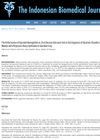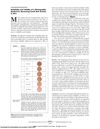 23 citations,
September 2021 in “Frontiers in Cellular and Infection Microbiology”
23 citations,
September 2021 in “Frontiers in Cellular and Infection Microbiology” Testosterone's effects on COVID-19 are unclear and need more research.
[object Object]  23 citations,
June 2015 in “Clinica Chimica Acta”
23 citations,
June 2015 in “Clinica Chimica Acta” Researchers found potential urine markers for polycystic ovary syndrome, including testosterone-glucuronide and 11α-hydroxyprogesterone, which may help diagnose the condition.
 22 citations,
August 2011 in “Endocrine Practice”
22 citations,
August 2011 in “Endocrine Practice” Most hirsutism cases are due to PCOS, and treatment focuses on lowering testosterone and blocking its effects.
 20 citations,
January 2003 in “Treatments in Endocrinology”
20 citations,
January 2003 in “Treatments in Endocrinology” Testosterone therapy can help improve mood, sexual function, and bone health in women with low androgen levels, but more research is needed to establish safe and effective guidelines.
 19 citations,
August 1999 in “European journal of endocrinology”
19 citations,
August 1999 in “European journal of endocrinology” The study concluded that testing hormone levels after stimulation is not reliable for identifying carriers of 21-hydroxylase deficiency; genetic testing is necessary.
 16 citations,
October 2007 in “Andrologia”
16 citations,
October 2007 in “Andrologia” DHT is a strong androgen that may pose less risk to the prostate compared to testosterone.
 15 citations,
February 2019 in “Internal Medicine Journal”
15 citations,
February 2019 in “Internal Medicine Journal” Australian doctors experienced in adult transgender healthcare mostly prescribe intramuscular testosterone and oral estradiol, recommend mental health assessments before hormone therapy, and support improved training and guidelines.
 14 citations,
October 2016 in “Physiological Research”
14 citations,
October 2016 in “Physiological Research” Alfacalcidiol and metformin together lowered testosterone in women with PCOS, but did not significantly improve acne, hair growth, or pregnancy rates.
 12 citations,
September 2017 in “Molecular and Cellular Endocrinology”
12 citations,
September 2017 in “Molecular and Cellular Endocrinology” Testosterone significantly affects sexual desire in both men and women, but its impact on women is more complex and influenced by psychological factors.
 12 citations,
October 2004 in “Experimental Gerontology”
12 citations,
October 2004 in “Experimental Gerontology” Changes in testosterone and estrogen receptor genes can affect how men age, influencing body fat, hair patterns, and possibly leading to skin disorders.
 11 citations,
November 2017 in “Electronic physician”
11 citations,
November 2017 in “Electronic physician” Depression severity is not linked to PCOS markers like BMI, insulin resistance, or testosterone levels.
 10 citations,
January 2019 in “Archives of Endocrinology and Metabolism”
10 citations,
January 2019 in “Archives of Endocrinology and Metabolism” Testosterone therapy may slightly increase sexual desire in women with HSDD but lacks broad recommendation due to safety concerns and limited approval.
 8 citations,
March 2012 in “The Journal of Steroid Biochemistry and Molecular Biology”
8 citations,
March 2012 in “The Journal of Steroid Biochemistry and Molecular Biology” Testosterone and dihydrotestosterone have similar effects on body composition and metabolic health in men.
 7 citations,
January 2003 in “Elsevier eBooks”
7 citations,
January 2003 in “Elsevier eBooks” Testosterone is crucial for development, growth, and various body functions in mammals.
 6 citations,
April 2019 in “Endocrinology and Metabolism Clinics of North America”
6 citations,
April 2019 in “Endocrinology and Metabolism Clinics of North America” Testosterone therapy for transmasculine individuals is generally safe with medical supervision, improves mental health, and has mixed effects on physical health.
 5 citations,
January 1984 in “Journal of psychosomatic obstetrics and gynecology/Journal of psychosomatic obstetrics and gynaecology”
5 citations,
January 1984 in “Journal of psychosomatic obstetrics and gynecology/Journal of psychosomatic obstetrics and gynaecology” The treatment reduced hair growth and testosterone in women with excess hair and had some effects on stress responses.
 5 citations,
December 2021 in “Physiological Research”
5 citations,
December 2021 in “Physiological Research” Men, particularly those with hair loss, are more likely to get the virus, and those with prostate cancer may have milder symptoms. Testosterone's role in the disease is unclear, and the virus doesn't seem to harm male fertility. Women with PCOS might be at higher risk. More research is needed.
 1 citations,
November 2002 in “Endocrine practice”
1 citations,
November 2002 in “Endocrine practice” The patient's high testosterone was reduced by a medication that suppresses gonadotropin.
 1 citations,
July 2015 in “Cambridge University Press eBooks”
1 citations,
July 2015 in “Cambridge University Press eBooks” Testosterone therapy can improve sexual function in women but long-term safety is unclear.
 May 2023 in “IntechOpen eBooks”
May 2023 in “IntechOpen eBooks” More research is needed to understand how testosterone is maintained in adult males.
 December 2024 in “Frontiers in Neurology”
December 2024 in “Frontiers in Neurology” Testosterone with finasteride improved muscle and bone health in men with spinal cord injury.
 February 2023 in “IntechOpen eBooks”
February 2023 in “IntechOpen eBooks” Testosterone replacement therapy helps manage deficiency and has various methods, but requires careful monitoring to avoid side effects.

Hormones, especially testosterone and DHT, are key for penis development and function, and testosterone therapy may help with erectile dysfunction in those with low levels.
 July 2015 in “Cambridge University Press eBooks”
July 2015 in “Cambridge University Press eBooks” Androgens like testosterone affect skin health and can lead to conditions such as acne and hair loss, with various treatments available.
December 2020 in “Journal of Skin and Sexually Transmitted Diseases” No strong link between testosterone or DHEAS levels and acne or hair loss in females.
 11 citations,
August 1997 in “Expert Opinion on Therapeutic Patents”
11 citations,
August 1997 in “Expert Opinion on Therapeutic Patents” Many potential alopecia treatments need more testing to confirm they promote acceptable hair growth with minimal side effects.
[object Object]  31 citations,
September 2006 in “International journal of gynaecology and obstetrics”
31 citations,
September 2006 in “International journal of gynaecology and obstetrics” New treatments for PCOS focus on insulin resistance and reducing testosterone levels, along with traditional hormone therapies.
 1 citations,
June 2021 in “The Indonesian Biomedical Journal”
1 citations,
June 2021 in “The Indonesian Biomedical Journal” Glycated hemoglobin is not as effective as the oral glucose tolerance test for diagnosing blood sugar problems in women with PCOS in Southern Iraq.
 4 citations,
November 2011 in “Archives of Dermatology”
4 citations,
November 2011 in “Archives of Dermatology” The photographic method for measuring facial hair density is reliable and valid but needs further testing on different hair densities and skin colors.
 1 citations,
July 2018 in “Elsevier eBooks”
1 citations,
July 2018 in “Elsevier eBooks” Many treatments for hair loss show potential, but more testing is needed to confirm their effectiveness. Only minoxidil for women and minoxidil and finasteride for men are FDA approved.





























